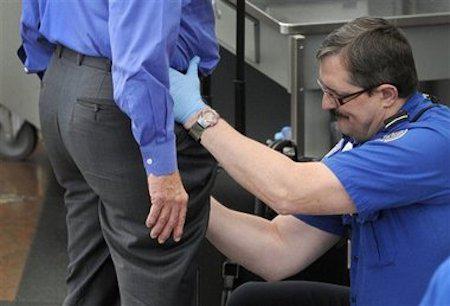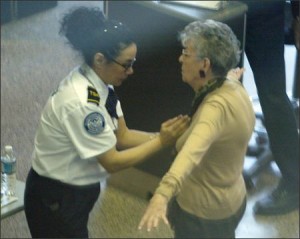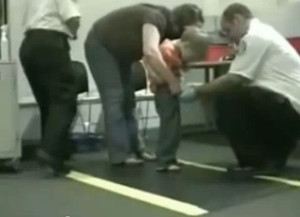TSA has no excuse to continue the groping / Chertoff’s role in “security”
Jun 8 2015 / 3:28 pm
James Bovard, USAToday – Last August, Transportation Security Administration chief John Pistole attacked an article I wrote, stating that it was “Misleading, inaccurate and unfairly disparages the dedicated (TSA) workforce. … We will not sit back and allow misinformation and conjecture to malign our employees.”
Pistole resigned last December — in time to miss the uproar this week about TSA agents failing to detect 95% of the weapons and bombs smuggled past them by Inspector General testers. While Pistole is leading the PR pushback to absolve his former agency, the I.G. report is the latest confirmation that TSA continues blindly blundering and pointlessly abusing Americans’ rights and privacy.
[Photo from “Two TSA Screeners Fired Over Scheme To Grope ‘Attractive’ Male Passengers“]
Shortly after TSA was created in late 2001, one of its early mottoes was “Dominate. Intimidate. Control.” From the start, the TSA put more focus on browbeating hapless travelers than intelligently focusing on actual aviation hazards.
Though Transportation Secretary Norman Mineta promised that TSA would hire “the best and the brightest,” TSA was soon busy issuing blanket denials in response to employee abuses. In 2004, I wrote a New York Times op-ed detailing arrests of TSA agents around the nation for looting travelers’ luggage. At the time the piece came out, the TSA was adamant that baggage thefts by its agents were a minor, localized problem. A few months later, TSA announced a de facto nationwide class action settlement for 15,000 passengers who had formally complained of being pilfered by TSA agents. More than 400 TSA agents have been fired for stealing from travelers.
In 2007, TSA expanded its covert behavior detection teams to search out tell-tale signs of dangerous travelers. More than 30 TSA agents complained in 2012 that the behavior-detection program at Boston’s Logan International Airport, which relied on idiotic terrorist profiles such as black guys wearing baseball caps backward or Hispanics traveling to Miami. At the Newark airport, TSA agents complained that supervisors pressured them to fabricate false charges against illegal aliens to boost the program’s arrest numbers.
Thousands of TSA agents continue roaming airports as part of the Screening of Passengers by Observation Techniques (SPOT) program, conducting “chat-downs” and ferreting out “micro-expressions” that signal trouble. TSA’s secret checklist of dangerous traveler traits, which recently leaked out, includes yawning, throat clearing, “wringing of hands,” “widely open staring eyes,” and gazing down. The most ludicrous warning sign is “excessive complaints about the screening process” — probably not the first trick terrorist groups teach would-be suicide bombers. No wonder that reports by the Inspector General and Government Accountability Office found that the TSA’s behavior detection program is ineffective and a waste of tax dollars.
In 2010, TSA expedited deploying of whole body scanners that captured nude images of travelers. The Electronic Privacy Information Center labeled the scanners “One of the most sweeping, most invasive and most unaccountable suspicionless searches of American travelers in history.” Travelers who objected to the see-all scanners were often intentionally brutalized with “enhanced” pat-downs to teach them a lesson. USA TODAY reported that, “the new searches … require screeners to touch passengers’ breasts and genitals.” TSA has also been caught repeatedly lying about the scanner’s health perils; a PBS-ProPublica report revealed that one type of widely-used scanner (which was discontinued in 2013) could cause six to 100 cancer cases per year among travelers. The fact that the TSA agents failed 95% of the recent undercover tests proves that the whole body scanners are far less reliable than the agency claimed.
The Department of Homeland Security admitted in 2011 congressional testimony that “the large majority of travelers pose no security risks.” TSA cannot admit this self-evident truth without also conceding that it is pointlessly abusing and delaying millions of travelers every day. Instead, TSA continues a “security theater” routine that is far more effective at subjugating Americans than protecting them.
TSA chieftains have perpetually promised to reform their agency but the scandals continue. Federalizing airport security was a knee-jerk reflex after 9/11. Like the PATRIOT Act, it presumed that vesting unchecked sweeping power in government agents would be a magic bullet to vanquish all threats. But after more than a dozen years of pratfalls, it is time to admit that TSA, after groping millions of Americans, has no excuse for groping millions more.


James Bovard is the author of Public Policy Hooligan.
Former Homeland Security chief – and apparently Israeli citizen – Michael Chertoff has played a role in all this:
Fear Pays: Chertoff, Ex-Security Officials Slammed For Cashing In On Government Experience
– Marcus Baram, Huffington Post, 11/23/2010:
After last month’s plot to send bombs from Yemen to the United States aboard a cargo plane, former U.S. Homeland Security chief Michael Chertoff’s whiskerless visage was ubiquitous on cable news. Solemnly warning that the nation needed stronger security procedures, Chertoff patiently repeated his talking points on ABC News’s “World News Tonight”, “Fox and Friends”, CNBC’s “Squawk Box” and Bloomberg TV.
Almost unmentioned in these appearances: Chertoff has a lot to gain financially if some of these measures are adopted. Between his private consulting firm, The Chertoff Group, and seats on the boards of giant defense and security firms, he sits at the heart of the giant security nexus created in the wake of 9/11, in effect creating a shadow homeland security agency. Chertoff launched his firm just days after President Barack Obama took office, eventually recruiting at least 11 top officials from the Department of Homeland Security, as well as former CIA director General Michael Hayden and other top military brass and security officials.
(Chertoff’s predecessor at DHS, Tom Ridge, has also parlayed his experience into a lucrative career. Since 2005, he has served on the board of Savi Technology, the primary technology provider for the Pentagon’s wireless cargo-monitoring network, and he has served as a senior advisor to TechRadium, Inc., a Texas-based security technology company.)
Chertoff’s clients have prospered in the last two years, largely through lucrative government contracts, and The Chertoff Group’s assistance in navigating the complex federal procurement bureaucracy is in high demand. One example involves the company at the heart of the recent uproar over intrusive airport security procedures — Rapiscan, which makes the so-called body scanners. Back in 2005, Chertoff was promoting the technology and Homeland Security placed the government’s first order, buying five Rapiscan scanners.
After the arrest of the underwear bomber last Christmas, Chertoff hit the airwaves and wrote an op-ed in The Washington Post advocating the full-body scanning systems without disclosing that Rapiscan Systems was a client of his firm. The aborted terror plot prompted the Transportation Security Agency to order 300 machines from Rapiscan. Yet last spring, the Government Accountability Office reported that, “It remains unclear whether [the scanners] would have been able to detect the weapon” used in the aborted bombing attempt. And according to a recent report by DHS’s Inspector General, the training of airport screeners is rushed and poorly supervised.
In the past year and a half, $118 million in stimulus funds have been used to buy technology from Rapiscan, but all that money hasn’t produced many jobs — the ostensible purpose of the American Recovery and Reinvestment Act. In fact, it accounts for only 84 positions, according to a HuffPost analysis of government data, meaning roughly $1.4 million was spent to create each job.
Rapiscan has upped its lobbying expenditures in recent years, spending $271,500 so far this year compared to $80,000 five years ago, USA Today reports. As a measure of the firm’s influence, one of the honored guests accompanying President Obama on his recent trip to India was Deepak Chopra, the president and CEO of OSI Systems, which owns Rapiscan. India plans to install the scanners at its airports in the wake of the 2008 Mumbai attacks.
Chertoff’s role has been strongly criticized by passenger right advocate Kate Hanni, the founder of FlyersRights.org, who opposes the use of the scanners on privacy and health grounds, citing government studies about radiation exposure.
“They’re trying to scare the pants off the American people that we need these things,” Hanni told The Huffington Post. “When Chertoff goes on TV, he is basically promoting his clients and exploiting that fear to make money. Fear is a commodity and they’re selling it. The more they can sell it, the more we buy into it. When American people are afraid, they will accept anything.”
Last week, two Republican congressmen took to the floor of the House to blast Chertoff and condemn the TSA’s security procedures. Rep. Ron Paul (R-Texas) introduced legislation against the scanning equipment.
“Michael Chertoff!” Paul exclaimed on the House floor, as shown in the video below. “I mean, here’s the guy who was the head of the TSA, selling the equipment. And the equipment’s questionable. We don’t even know if it works, and it may well be dangerous to our health.”
The pertinent segment starts around 4:30:
WATCH:
The Chertoff Group played no role in the sale of whole body imaging technology to TSA. Further, Secretary Michael Chertoff was in no way compensated for his public statements, in which he has consistently expressed long held beliefs in the deployment of effective technologies and techniques that eliminate security vulnerabilities such as those illustrated last year during the terrorist attempt on Christmas Day.
Rapiscan issued the following statement:
In 2009, Rapiscan Systems briefly engaged Chertoff Group, led by Michael Chertoff, as a consultant. During this period, Mr. Chertoff was a private citizen and regularly engaged in consulting activities for multiple clients. In that engagement, Mr. Chertoff and his staff of experts provided Rapiscan with advice and analysis with respect to a limited set of well-defined subjects unrelated to aviation security. Chertoff Group’s activities in that engagement were advisory, and neither Mr. Chertoff nor his staff has ever represented Rapiscan in any communications with the U.S. government.
The only other company that manufactures such scanners, L-3 Systems, has spent more than $1.4 million on lobbying the government since 2004 – one of its best-connected lobbyists is Linda Daschle, wife of ex-Senate Majority Leader Tom Daschle (D-S.D.), earning almost $100,000 in fees for working on “matters related to advanced imaging technolog,” reports The Hill.
Chertoff’s advocacy helped derail a bill proposed by Rep. Jason Chaffetz (R-Utah) which would have limited the use of scanners at airports. Though it sailed through the House, it flailed in the Senate after Umar Farouk Abdulmutallab’s failed bombing attempt. “But I also routinely heard that ‘Secretary Chertoff believes this is the right thing to do. Who are you to challenge him?'” Chaffetz told USA Today.
Just last month, Chertoff told CNBC, “The pressure from the public for more efficient screening will hopefully push the government to investment of technology.”
The scanning technology can present health risks to passengers by raising radiation exposure, according to an inter-agency report issued last winter. Pregnant women and children should not be scanned, although the radiation they are exposed to is “extremely small,” according to the Inter-Agency Committee on Radiation Safety report.
The scanning-technology debate illustrates just one of Chertoff’s many financial interests in the security sector. In the recent deal to break up U.S. security firm L-1 Identity Solutions among two top European defense firms, Chertoff was well-positioned: His firm was a strategic adviser to French aerospace and security conglomerate Safran, which paid more than $1.1 billion to acquire L-1’s biometrics identification units; and he sits on the board of BAE, the British defense giant which bought L-1’s government consulting and intelligence services, as reported by HuffPost’s Dan Froomkin earlier this year.
Chertoff, who is a frequent guest on cable news, often touts security proposals and technologies that align with the interests of or are manufactured by his clients. He recently told CNBC that he’d like to see “more investment in bio-security” because “I think we are beginning to lag a little behind in terms of being able to respond to biological threats.” The Chertoff Group has invested in BioNeutral, a biotech startup based in New Jersey that is developing technology to combat dangerous microorganisms. In a relatively rare disclosure, Chertoff acknowledged in the interview that “we do represent companies that make sensors and technology of that sort.”
The former Homeland Security secretary told CNBC that the country’s most pressing need is cybersecurity, describing a nightmare scenario of a digital attack on the country’s financial system, air-traffic-control system or the electric grid, emphasizing that the Obama administration “is not moving as far ahead as we would like it to be.” Last May, Chertoff played the role of the national security adviser during a simulated electronic attack called Cyber Shock Wave, which was hosted by the Bipartisan Policy Center and funded with donations of up to $150,000 each from General Dynamics Advanced Information Systems, PayPal, Symantec and other firms. Shortly before the simulation, Chertoff told HuffPost blogger Josh Rushing that he can see the U.S. responding to a cyber-attack with military forces — “Would it be easier to send a group of special forces in and blow the server up?” he asked rhetorically.
Chertoff neglected to mention that his firm assists clients with cybersecurity issues — one of the firm’s directors, Brian White, helped create the presidential-directed Cyber Security Center and the Comprehensive National Cyber Security Initiative. One of Chertoff’s roles at BAE, the largest defense firm in Europe, is to “help our government and private sector customers develop cyber security solutions,” according to the press release announcing his appointment to the board.
Chertoff has long touted the benefits of biometric identification systems — retina and fingerprint scans — stating in 2008 that he doesn’t consider them private but more akin to footprints, and that people shouldn’t fear the collection and sharing of such information. More recently, he has said that biometric devices are a step in the right direction. Unmentioned in most of these reports is the fact that Chertoff sits on the board of Clear, a new startup that has assumed the assets of Verified Identity Pass, the biometric ID system that charges $179 to allow people to bypass long security lines at the airport. It was picked up at a bankruptcy proceeding for just $6 million by two hedge fund managers.

